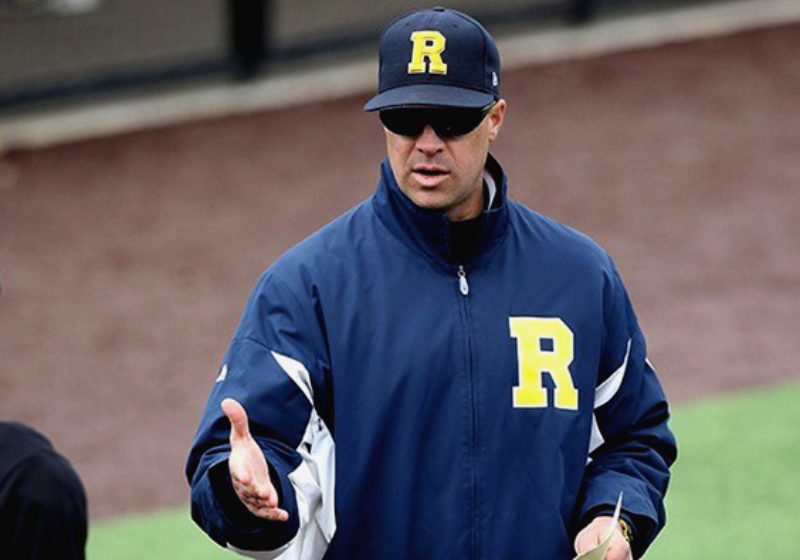Joe Reina took over as the head coach of UR Baseball in 2001, and has built a foundation of success for the program in the 16 years since. He has a lifetime of experience with the sport, spending time as a player and coach at not only various levels of competition but on multiple continents as well.
Reina is a Rochester native and attended Gates-Chili High School, where he led the team at shortstop. After graduating, he went to play at Monroe Community College, under the tutelage of Hall of Fame coach H. David Chamberlain. He earned multiple honors in his second season there and went on to receive a full athletic scholarship to Division I LIU Brooklyn, where he was a two-year starter and hit .371 with four grand slams his junior year.
Shortstops are often considered the captains of the defense, involved in a high percentage of plays in the infield and in charge of coordinating with the outfield. Reina’s time at the position made him naturally predisposed to coaching.
“[At shortstop], you’re always involved, you’re always moving, you’re always trying to read what other teams are trying to do,” he said. “I think the more I got to play it, the better I got at anticipating strategies from other coaches.”
After graduating with a degree in physical education, Reina went to Monroe Community College for his first coaching job. The team had tremendous success during his two years there, accumulating nearly 100 wins combined, with several players ending up as MLB draft picks.
Reina then accepted a two-year position as a graduate assistant at The College of New Jersey, which has a Division III program. He worked with the infield and hitters in another successful program, as the team came within a game of the College World Series in his first season there. Reina left TCNJ in 2001 having earned a master’s in education.
The following summer, Reina served as an assistant coach for the Bourne Braves of the Cape Cod Baseball League. The league is known as a major pipeline to the MLB—as of 2016, 297 current MLB players had spent some time in the CCBL—and Reina oversaw six players taken in the first round of the MLB draft on that Braves team.
Around the same time, Reina was fielding offers to coach at multiple schools, including several Division I schools as well as UR. Despite growing up five minutes from campus, he wasn’t overly familiar with the school.
“I never really knew what was on campus here until I actually came back for my interview and really was blown away by the academic prestige, the reputation it had, along with the vision of our director of athletics, not only for baseball but our entire athletics departments,” Reina said. “I think those were all very big selling points to me and something I wanted to be a part of.”
In between his first two years at UR, Reina continued to get unique coaching experience. As part of the MLB’s International Envoy program, he worked with baseball and softball players in Southern Germany and Japan over the course of the two summers. He worked with U.S. military families stationed in both countries, also working with some local clubs in Germany.
While overseas, Reina observed various differences in culture and approach to the game.
“I was in Germany when the World Cup was happening,” Reina said. “Trying to run practices when the German national team was playing, obviously you’ve got a pretty low attendance, if any at all.”
Reina’s first two teams at UR finished below .500, but he guided the Yellowjackets to 20 or more wins in six of the next seven seasons. He is the school’s career leader in coaching wins, at 331, and his teams have made the Liberty League playoffs in 11 of his 15 completed seasons.
To fill out the roster, Reina looks for players who fit the right mold relative to team cohesion and program goals.
“There’s been plenty of players who are extremely talented, that when they come to campus, they interact with our teams […] it doesn’t work,” he said. “So I want to make sure they’re good fits for us, personally socially, academically, obviously as well as the baseball aspect.”
Within the season, Reina and his coaching staff evaluate player performance with observation as well as conventional statistics, like batting average and earned run average, while also using a custom metric developed by the program, known as quality at bats.
A quality at bat (or QAB) is earned when a player achieves one of the following: a base hit, advancing a runner into scoring position, getting a run to score, hitting the ball hard, walking, getting hit by a pitch, and seeing 10 or more pitches in the at bat. The team has kept game-by-game data for each player on the stat since the beginning of April, and each player’s QAB average (ratio of plate appearances resulting in quality at bats) can be seen in the associated table.
| Player | QAB | PA | PCT |
|---|---|---|---|
| Jake Hertz | 40 | 79 | 0.506 |
| Pete Carrier | 42 | 80 | 0.525 |
| Jack Herman | 26 | 58 | 0.448 |
| Will Conroy | 24 | 46 | 0.522 |
| Grant Kilmer | 38 | 66 | 0.576 |
| Tyler Schmidt | 38 | 71 | 0.535 |
| David Reith | 37 | 64 | 0.578 |
| Aiden Finch | 45 | 72 | 0.625 |
| Kyle Trombley | 18 | 47 | 0.383 |
| Mark Davis | 22 | 39 | 0.564 |
| Owen Gabbey | 7 | 17 | 0.412 |
| Zach Miraz | 1 | 2 | 0.500 |
| Corey Ziring | 4 | 9 | 0.444 |
| Ryland McNabb | 2 | 7 | 0.286 |
| Team | 344 | 657 | 0.524 |
The metric helps push across a philosophy necessary to be a successful hitter at all levels. In a game where even the best hitters get out more often than not, getting QABs can keep a slump from getting into a player’s head, since they’ll know they’re bound to see better results if they keep hitting similarly. And it also keeps a player from trying to do too much, simplifying their approach at the plate.
Though the team has struggled this season, with a 7–17 record through Friday, Reina remains optimistic.
“We’ve struggled, and our record kind of reflects that. But I will say that in all my years of being coach here, the schedule we’ve played this year has been our most difficult by far,” he said.
“We’re playing better now than we’ve played all season, so that’s a trend that is very positive for us, not only to finish this year out and make a run to get into the Liberty League playoffs, but for the next couple of years to come. I think it’s just continuing for our guys to work hard, we’re still playing for something, and it’s just guys getting better each and every day.”






